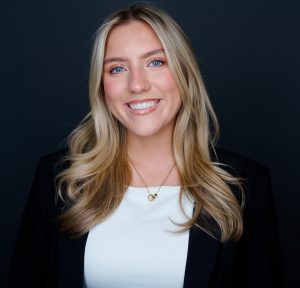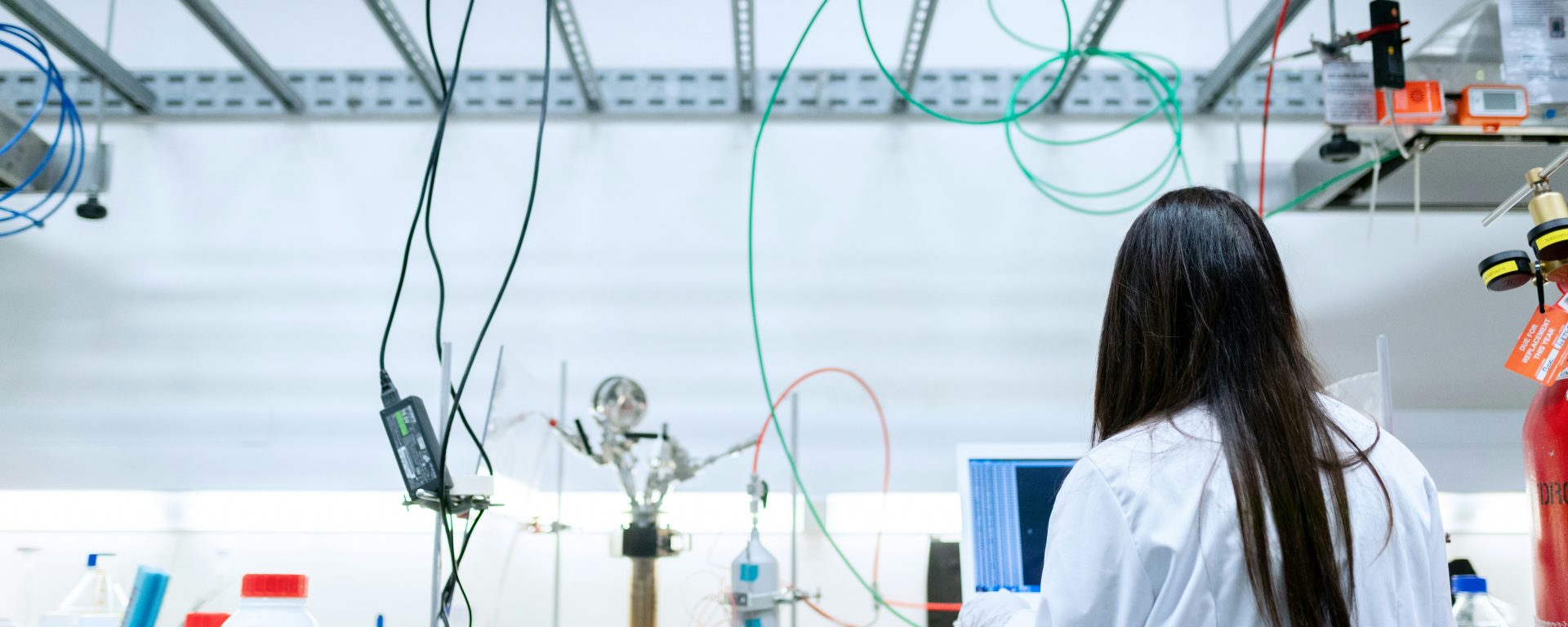Epilepsy: a life-altering word. Time stood still as the doctor gave me her diagnosis. My knuckles whitened as my grip tightened on the armchair. After years of not knowing the root cause of my health issues, I now had an answer. My diagnosis changed the trajectory of my life as I knew it. This pivotal moment separated my life into a “before” and an “after.” The love for math and science from my “before” life melded into a passion for navigating the landscape of innovation and technology. This passion defined my “after” life, and eventually propelled me into intellectual property law. But, let me start at the beginning with the “before.”
Before
I’ve always had a love for math and science. This love sent me down the path of obtaining my bachelor’s degree in biomedical engineering at Florida State University. I dove headlong into my courses and as much research as I could get my hands on. I explored a range of opportunities through a National Science Foundation internship, an undergraduate honors thesis, and a job working as a technical writer for a government defense contractor.
Before my diagnosis, I was content with synthesizing data. I enjoyed solving problems with formulas.
Looking back, it was easy to be detached from the real-world implications of innovations created in labs like the ones I worked in. It was easy to crunch the numbers, perform the lab duties, and forget about the impact of what I was doing.

After
Being diagnosed with epilepsy allowed me to remember how inventions can truly change people’s lives. Using epilepsy treatments that addressed my symptoms transformed my life in a profound way. My experience with how inventions can positively impact lives made me want to help others have this positive experience as well.
After my diagnosis, I reevaluated my passions. I recognized that my love for the STEM field was no longer located entirely in the lab. I realized that I wanted to align myself more with the “human” side of STEM. What may have seemed like routine lab performances were now smaller parts of a greater whole. When I would be doing daily quality control tests on cell cultures, I now was able to more clearly see the bigger picture of how this impacts real people. I became passionate about advocating for the inventions that were now a bigger part of my own reality.
For groundbreaking technology and treatment to reach others like it supported me, the promotion of innovation is essential. Promoting innovation can lead to new inventions, and ultimately improve quality of life. With my experience in STEM and research, the best way to accomplish this seemed to be by pursuing a career in supporting creation.
My lab and STEM experience showed me how much time and resources go into research and development. My diagnosis gave me an appreciation for the importance of rewarding that hard work to incentivize further innovation. Without incentives, who would want to spend all the time and money on developing inventions? These two perspectives have shown me that the key to promoting innovation lies in supporting the inventors behind it.
With this new realization, I was eager to explore a new path that would allow me to support inventors in developing important innovations. I believed that innovations of all types have the potential to positively impact everyone’s lives. This belief sparked a new passion in me for protecting these innovations in order to ensure their continuous growth and lasting impact.
Although my diagnosis may have given me a new perspective, it hasn’t weakened my interest in STEM. Despite realizing that my desired role extended beyond the laboratory, I still wanted to pursue a path that merged my newfound passion with my love for STEM.
Discovering IP
With a new desire to carve out a different path, I turned to Google for some guidance on where to start. It wasn’t long into my search that I came across the field of intellectual property (IP) law. Intrigued, I reached out to an attorney I knew so I could learn more. She connected me with her former law school friend who practices IP litigation. Through this connection, I learned about how IP attorneys help protect intellectual property by advocating for IP owners in lawsuits. Our conversation also highlighted the need for attorneys with scientific backgrounds who understood both science and the law. That was the moment when I realized that becoming an IP attorney seemed like a great way to combine my previous love for STEM with my newfound passion for protecting innovation.
From my Google search and meeting with an IP litigation attorney, I learned that intellectual property includes various types of protections, such as patents. With a patent, inventors have the right to exclude others from making their invention for a specified period of time. It is these exclusive rights that can promote innovation by incentivizing investment in research and development. Armed with these exclusive rights, patent holders have the opportunity to recover development expenses. They can generate revenue through licensing agreements, which grant others the right to manufacture their invention for a fee. Alternatively, they can make a profit as the sole seller of the patented invention in the market for the duration of the patent’s validity.
The treatments that have greatly impacted my life, and that of many others, are precisely the kinds of innovations incentivized by the exclusive rights granted by patents. However, one of the remarkable aspects of innovation is its continuous advancement. Why stop at something that performs well when there’s the potential to develop something better? A cool example of this is a potential new epilepsy drug XEN1101 by Xenon. Although it is still pending market approval from the Food and Drug Administration, this drug received a patent in October of 2021. By securing this patent, Xenon will be able to use its exclusive rights to recover the significant financial investment required to develop such a drug. Given that epilepsy drugs are already available on the market, one might question why a company would bother to develop a new seizure treatment. Without patent protection, such endeavors might indeed appear unworthy of the expense. Luckily, this isn’t the case.
XEN1101 helps those with focal seizures. Currently, 50% of patients with focal seizures are considered inadequately managed. Early clinical data shows that XEN1101 has the potential to reduce their seizures by ≥ 50%, which would greatly improve their quality of life. Even with current epilepsy treatments on the market, there is not a one size fits all. There is always potential to develop something better.
With the possibility of patent protection, innovators like Xenon can have the necessary motivation to continue striving for improvement that can benefit us all.
This, in a nutshell, is why I want to be an IP lawyer. As an IP lawyer, I can work alongside inventors to help them obtain patents and assert their exclusive rights over the inventions they worked hard to develop. I am optimistic and excited by the possibilities that exist in this field and my potential role in protecting the revolutionary innovations that are emerging. After recognizing that I wanted to pursue IP law, I knew I just needed to find the right place to do it.
IP at Loyola
When applying to law school, I knew I wanted to be at a school that would set me up for a successful career in IP. I wanted a supportive environment with ample opportunities to do so.
Prior to committing to law school at Loyola, I met Professor Cynthia Ho at the annual IP alumni event. Here, she introduced me to current Loyola IP students and alumni. Everyone I spoke to was eager to tell me about their path into IP and give me advice for how to navigate the transition from a STEM background to law school. I knew that if these individuals were willing to be this generous with their time and advice to me as a prospective student, it would only be amplified once I chose to commit to Loyola.
As a first-year law student (“1L”) at Loyola, my understanding of IP has expanded significantly. This understanding is attributed to the unique opportunity to take IP classes as a 1L, such as IP legal writing and an IP elective. In IP legal writing, I have learned about IP through hypothetical cases involving issues with patents, copyrights, issues, and trademarks. I particularly enjoyed our first assignment, which involved completing a research memo on the potential violation of a patent for peanut butter pancakes.

I am also enrolled in the IP elective, Global Access to Medicine: A Patent Perspective. This elective has shown me different perspectives on how patents can both promote innovation and hinder access to affordable medicine.
Each of these courses have exposed to me how IP works in the real world and confirmed my interest in IP. The more I learn about IP, the more I desire to learn even more.
Additionally, I am currently a 1L Representative for Loyola’s IP Law Society (“IPLS”). As a 1L Representative, I work as a liaison between the executive board and my section to notify them of all the IP opportunities throughout the year. I have enjoyed sharing my excitement about IP with my fellow students.
Being involved in IPLS has also given me the opportunity to attend various IP networking events. At these events, I engaged with attorneys from diverse professional backgrounds and learned about the vast range of opportunities available in the field. I am incredibly excited to explore and apply this interest even further this summer, as a 1L Summer Associate at Marshall, Gerstein & Borun (an IP firm).
My “before” and “after” are defined by one event but one is not more important than the other. My experiences and knowledge gained “before” continues to influence my “after” everyday through my decision to attend Loyola and pursue IP. I am excited to see how my story guides me through the long career I have ahead of me!

Katelyn Sears
Assistant Blogger
Loyola University Chicago School of Law, J.D. 2026
